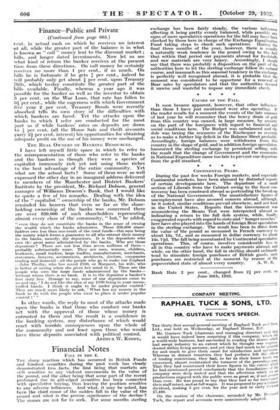THE REAL OWNERS OF BANKING RESOURCES.
.I have left myself little space in which to refer to the misrepresentation of those who refer to the banks and the bankers as though they were a species of capitalist immensely rich yet not using those riches . to the best advantage of the entire community. Yet . what are the actual facts ? Sonic of them were so well expressed the other day in an -inaugural address delivered to members of the Manchester and District Bankers' Institute by -the president, Mr. Richard Dobson, general manager of 'Williams Deacon's Bank, that I would like to quote a few of his remarks. Dealing with the idea of the " capitalist " ownership of the-banks, -Mr. Dobson 'reminded his hearers that even so far as the share- holding ownership of the banks was concerned there are over 350,000 of such shareholders representing almost every class of the community, " but," he added, " even they do not constitute the banks in the sense of owning the wealth which the banks administer. These 350,000 share- holders own less than one-tenth of the total funds—this sum being . the money which forms a guarantee to -all who entrust their money to the banks, namely, the depositors. It is the depositors who own the great sums administered by the banks. Who are these depositors ? There are not less than seven millions of them- - probably substantially more Thoy are men, women, children, -workmen, small traders, large traders, manufacturers, merchants, statesmen, lawyers, accountants, architects, doctors, companies trading and financial—all the people who go to make our England --John Thrifty, who has saved £100, or Margaret, his wife, who Is better at saving when she gives her mind to it. These are the people who own the large funds administered by the banks- - without whom there is no bank. It is to the depositor a banker's first duty lies. Strange to say, none of our depositors come to us and say, ' I do not like the idea of my £100 being in your uncon- trolled hands. I think it ought to be under popular control.' They are much more likely to ask, What has my money in the bank to do with the people who want to place it under popular control ? ' " In other words, the reply to most of the attacks made upon the banks is that those who conduct our banks het with the approval of those whose money is entrusted to them and the result is a confidence in the banking system, any disturbance of which would react with terrible consequences upon the whole of the community and not least upon those who would have these deposits associated with political control.
ARTIIUR.W. KIDDY -












































 Previous page
Previous page